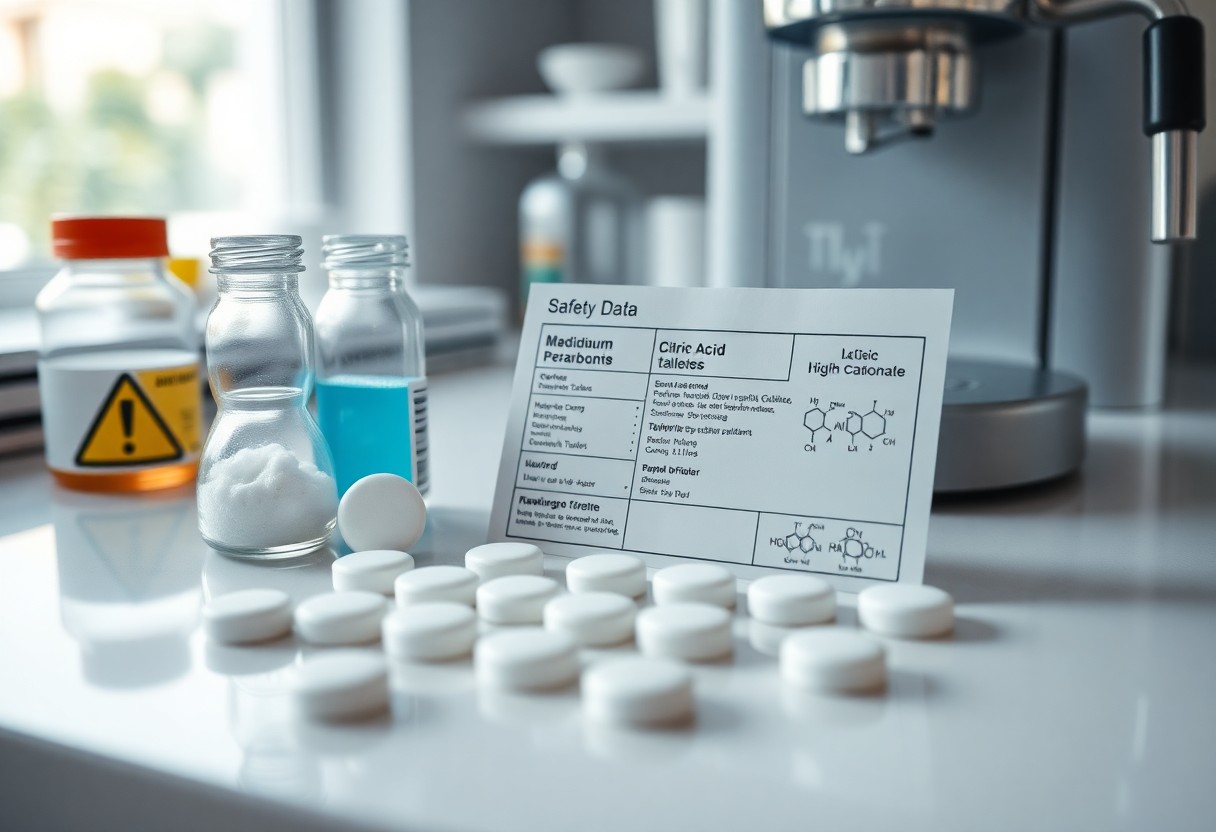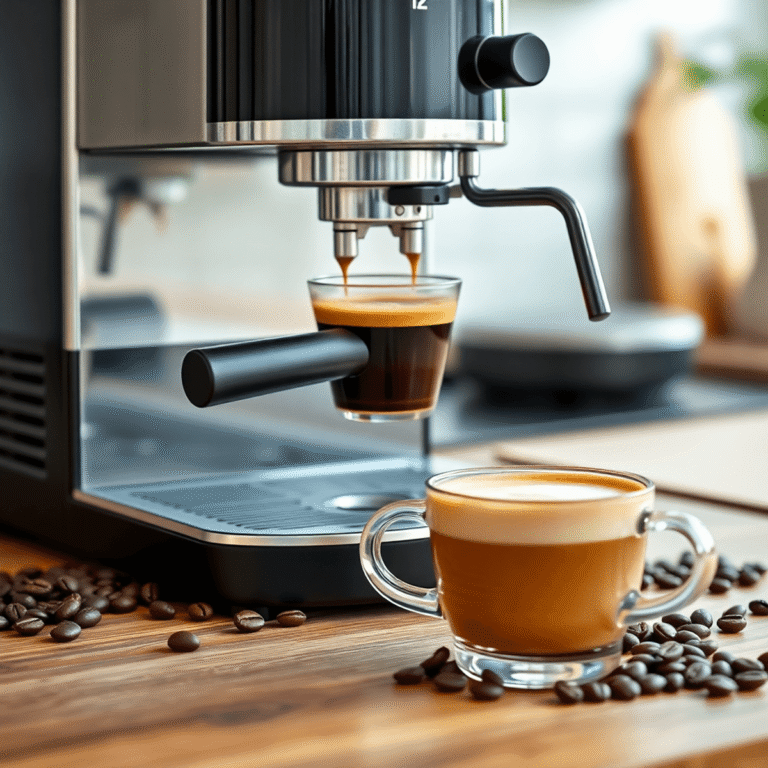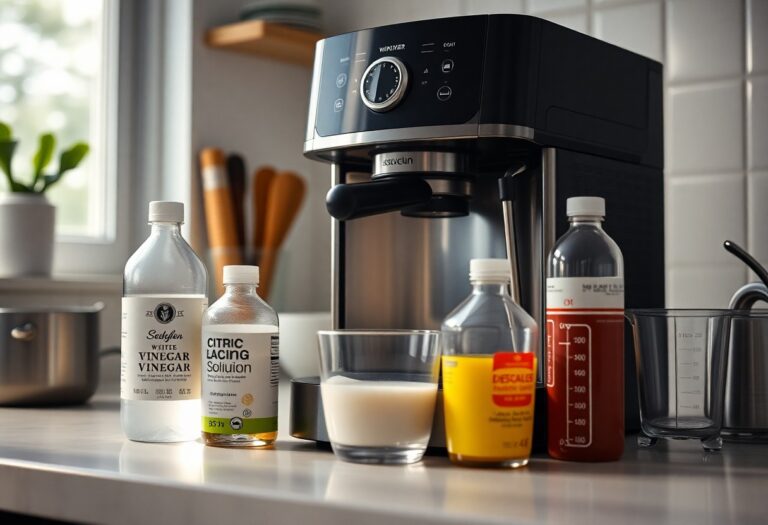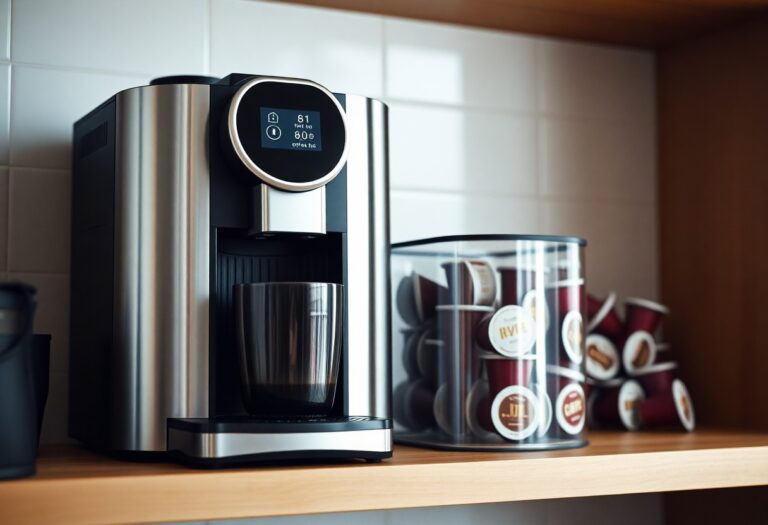What is in Coffee Machine Cleaning Tablets – Chemical Composition
There’s a lot more to coffee machine cleaning tablets than meets the eye. These tablets contain a mix of powerful surfactants, alkaline compounds, and citric acid that work together to eliminate coffee oils, residues, and limescale. Understanding the chemical composition not only helps you appreciate their effectiveness but also ensures you’re using them safely in your coffee machine. By unveiling what’s inside these tablets, you can make informed choices for your equipment and your favorite brews.
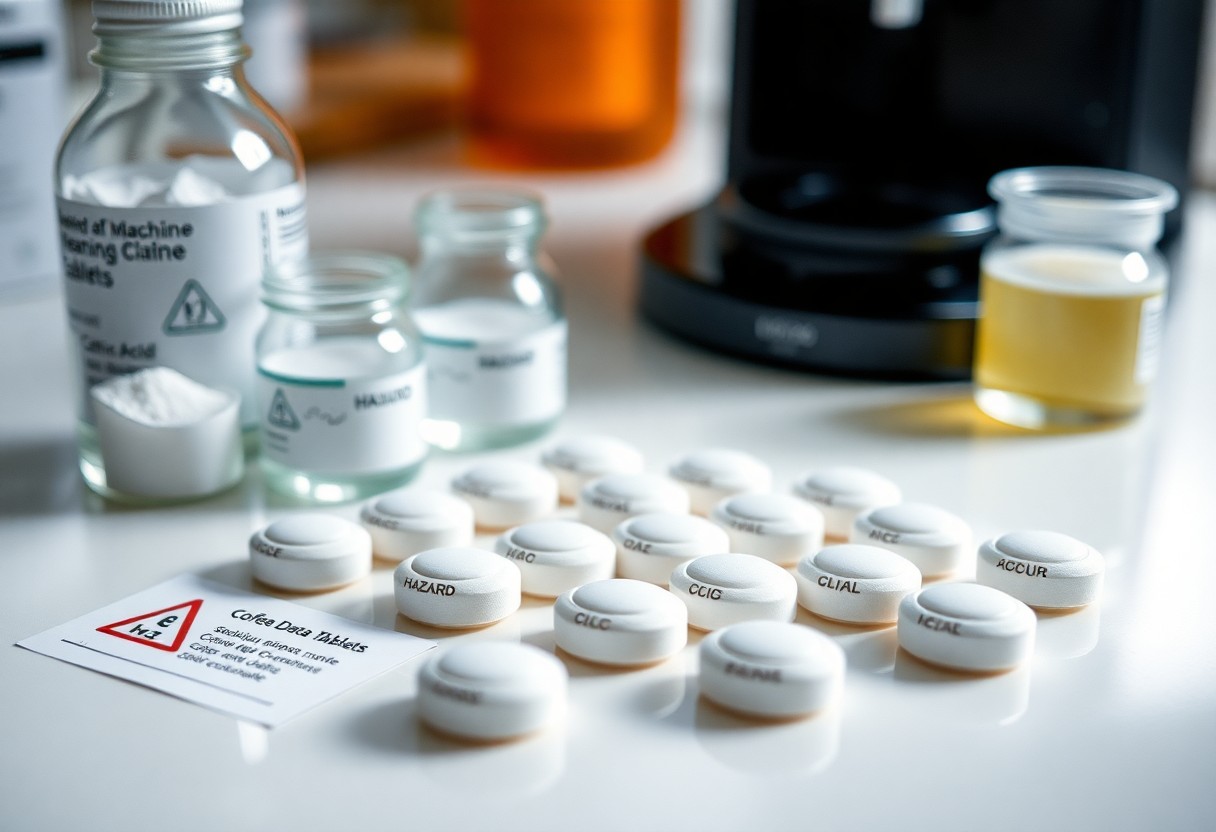
Key Takeaways:
- Coffee machine cleaning tablets typically contain citric acid, which acts as a natural cleaner to remove calcium buildup and mineral deposits.
- They often feature sodium bicarbonate, known for its gentle abrasive properties that help in scrubbing away residue while being safe for machine components.
- Many cleaning tablets include alkaline agents to neutralize acids and enhance the cleaning power against coffee oils and stains.
- Some formulations may incorporate surfactants to improve the dispersion of cleaning agents, ensuring an even and thorough cleaning process.
- Additional ingredients may include flavor agents or fragrances aimed at eliminating residual odors, leaving the coffee machine smelling fresh.
The Essential Ingredients: Breakdown of Common Compounds
Understanding the key components in coffee machine cleaning tablets reveals how effective they are in maintaining your coffee maker. These compounds work synergistically to dissolve scale, eliminate residue, and neutralize odors, ensuring your machine remains in optimal condition for brewing your favorite cup. A closer examination of three predominant ingredients—citric acid, sodium bicarbonate, and phosphates—demonstrates their individual contributions to the cleaning process.
Citric Acid: The Natural Cleaning Powerhouse
Citric acid is a natural acid derived from citrus fruits, known for its cleaning efficiency. Its ability to effectively dissolve minerals like calcium and lime makes it imperative for descaling your coffee machine. This organic compound not only tackles tough deposits but also provides a fresh scent, enhancing your coffee experience.
Sodium Bicarbonate: The Detergent and Deodorizer
Sodium bicarbonate, commonly known as baking soda, acts as a powerful detergent and deodorizer in cleaning tablets. Its mild alkaline properties allow it to neutralize acidic residues left behind after brewing, contributing to more thorough cleaning. This compound is particularly effective in combating unpleasant odors that can develop over time.
By gently reacting with acids in residues, sodium bicarbonate not only eliminates grime but also contributes to maintaining your machine’s components. For example, coffee oils can leave stubborn residues that other cleaners might struggle with. In this case, the released carbon dioxide from sodium bicarbonate helps to lift such build-ups, resulting in a cleaner, healthier coffee maker. You can trust that using cleaning tablets with sodium bicarbonate will leave your coffee machine in tip-top shape.
Phosphates: Enhancing Cleaning Efficiency
Phosphates are often included in cleaning formulations due to their effectiveness in breaking down organic matter and enhancing overall cleaning efficiency. They aid in softening water, which further improves the action of other cleaning agents, allowing for a more complete clean.
This compound plays a key role in ensuring that your coffee machine remains free of mineral buildup and other residues. Phosphates can bind with calcium and magnesium ions in hard water, preventing them from depositing on surfaces and disrupting the performance of your machine. Additionally, by improving the overall formulation of the cleaning tablet, phosphates help achieve better results with less effort on your part, making your coffee machine maintenance routine more effective and enjoyable.
The Role of Surfactants: Grease and Grime Be Gone
Surfactants play a vital role in coffee machine cleaning tablets by effectively breaking down and eliminating grease and grime. Their molecular structure allows them to disperse oils and dirt, making it easier for water to wash them away. This means that when you use cleaning tablets, you aren’t just relying on chemical reactions; you’re also benefiting from the enhanced physical cleaning properties of surfactants. For more detailed information, refer to the SAFETY DATA SHEET COFFEE MACHINE CLEANING ….
Nonionic vs. Anionic Surfactants: What’s the Difference?
Nonionic surfactants have no charge, making them less sensitive to water hardness, while anionic surfactants carry a negative charge and are often superior in removing particulates. In practical terms, this means if your coffee machine has tough, sticky residues, anionic surfactants may handle the job effectively, while nonionic ones excel in milder cleaning applications where the residue isn’t as stubborn.
How Surfactants Improve Cleaning Performance
Surfactants significantly enhance the cleaning performance of coffee machine cleaning tablets by reducing surface tension in water. This allows the cleaning solution to penetrate and dissolve contaminants more efficiently. The action of surfactants ensures that oils are emulsified and dirt is suspended in the solution, leading to thorough cleaning results. By utilizing both nonionic and anionic surfactants, manufacturers tailor the performance of cleaning tablets to target different types of residues found in coffee machines.
The effectiveness of surfactants can be seen in the impressive results when dealing with milk residue in coffee machines, which can be notoriously difficult to clean. A cleaning tablet that combines the powers of different surfactants not only tackles stubborn milk proteins but also works well against coffee oils and mineral deposits. In lab tests, a combination of nonionic and anionic surfactants has been shown to reduce residue by up to 90%, showcasing just how critical their role is in maintaining your coffee machine’s performance and longevity.
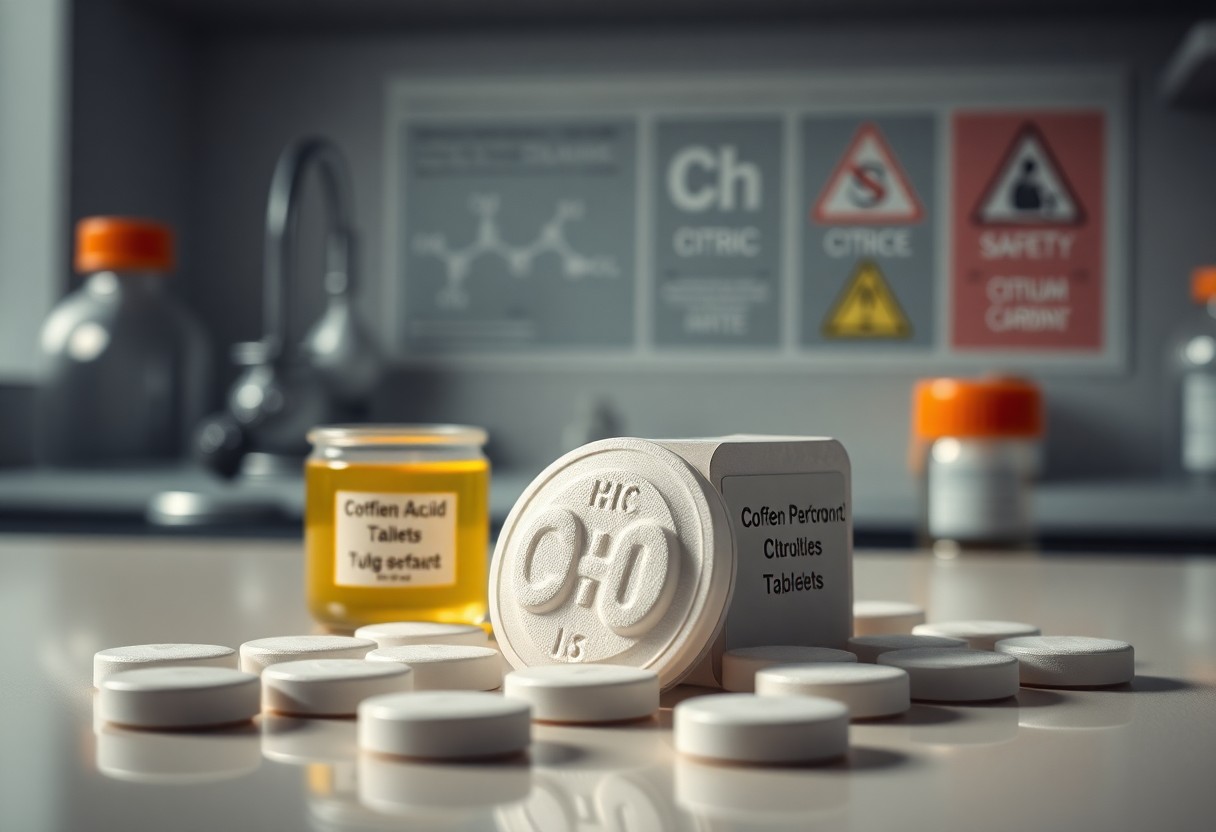
Chemical Safety and Environmental Impact
Understanding the safety and environmental effects of coffee machine cleaning tablets is vital for responsible use. Many tablets contain harsh chemicals, which could pose risks not only to your health but also to the environment. Residual chemicals can seep into the water supply during disposal, leading to pollution. Opting for safer products helps mitigate these issues and ensures that your cleaning habits align with a more sustainable lifestyle.
Evaluating the Toxicity of Cleaning Agents
Cleaning agents in these tablets often include substances like citric acid and sodium bicarbonate, which offer effective cleaning without being overly toxic. However, some formulations may contain phosphates or other compounds that could cause irritation or toxicity in high concentrations. Assessing the materials used is imperative to gauge their safety for both users and the environment.
Eco-Friendly Alternatives in Cleaning Tablets
There are eco-friendly alternatives to traditional cleaning tablets, primarily derived from natural ingredients. These options often leverage plant-based enzymes and baking soda to effectively clean without harming the environment. Products labeled as biodegradable break down naturally and reduce landfill waste, making them a responsible choice for conscientious consumers.
For those seeking eco-friendly alternatives, consider brands that specialize in sustainable cleaning solutions. Many utilize ingredients like vinegar and lemons for their antibacterial properties and natural deodorizing abilities. These alternatives not only minimize the chemical footprint but also often come in recyclable packaging, further enhancing their environmental appeal. Furthermore, properly researching and selecting such products ensures you maintain effective cleaning protocols that respect both your health and the planet.
The Chemistry of Hard Water and Its Solutions
Hard water contains higher concentrations of minerals, primarily calcium and magnesium ions, which originate from the natural dissolution of geological formations. These minerals can lead to the formation of limescale when heated, significantly affecting the performance and longevity of your coffee machine. Various water softening methods, such as ion exchange or the use of descaling agents, can mitigate the effects of hard water, ensuring your coffee remains flavorful while also protecting your machine.
How Hard Water Affects Coffee Machines
Exposure to hard water causes limescale buildup in your coffee machine’s components, obstructing flow paths and impacting heating efficiency. Over time, you may notice your coffee brewing slower or at a suboptimal temperature, leading to diminished flavor quality. Regular maintenance is necessary to prevent this buildup, which can severely affect your machine’s longevity and your coffee’s taste.
Descaling Agents: Protecting Your Investment
Descaling agents are formulated to dissolve limescale deposits efficiently, restoring your coffee machine to its optimal function. By introducing these agents into your maintenance routine, you are not only prolonging the life of your appliance but also ensuring that each cup of coffee maintains its rich flavor. Common ingredients like citric acid or phosphoric acid work effectively against limescale without causing harm to the machine.
Utilizing descaling agents regularly can save you from costly repairs or replacements of your coffee machine. For instance, using a descaling solution every few months can remove built-up limescale, which, if left untreated, can lead to blockages and even mechanical failure. Products that include natural acids, such as citric acid from citrus fruits, effectively break down mineral deposits while being gentle on internal components. This proactive step in your maintenance routine means you can enjoy high-quality coffee without the fear of damaging your machine from hard water exposure.
Practical Application: Choosing the Right Cleaning Tablet for Your Machine
Selecting the appropriate cleaning tablet for your coffee machine is important for optimal performance and longevity. Start by identifying the type of machine you own—espresso machines, drip coffee makers, and single-serve machines might all require different formulations. Always refer to your manufacturer’s recommendations for cleaning solutions and tablet frequency to ensure you maintain your machine without voiding warranties or causing damage.
Compatibility Considerations
Your coffee machine’s technology and design dictate the kind of cleaning tablet you should use. Check for any specifications regarding compatible chemical compounds in the user manual. Using unsuitable cleaning agents can lead to malfunction or corrosion, affecting the taste of your brew.
Brand Variations and Their Chemical Formulations
Different brands may utilize distinct formulations for their cleaning tablets, impacting efficacy and safety. A tablet from Brand A may consist primarily of citric acid, while Brand B might include phosphoric acid for more aggressive cleaning. Look for brands that specify the ingredients and their intended function on packaging to tailor your choice based on your machine’s specific needs.
The variation in chemical formulations across brands reflects a diversity of cleaning approaches. For instance, brands like Urnex often use organic acids and surfactants, which are effective in breaking down coffee oils and mineral deposits without harsh side effects. Conversely, some brands use more potent synthetic chemicals, delivering faster results but potentially harming certain materials in your machine. Thoroughly reviewing the cleaning agents used can empower you to make an informed decision that balances effectiveness with safety for your specific coffee maker.
To wrap up
Conclusively, understanding the chemical composition of coffee machine cleaning tablets allows you to make informed choices for maintaining your equipment. These tablets typically contain ingredients like citric acid, sodium bicarbonate, and surfactants that effectively remove mineral buildup and oily residues while being safe for your machine. By utilizing these cleaning tablets, you ensure that your coffee maker remains efficient and produces the best-tasting brews, ultimately enhancing your coffee experience. Investing in quality cleaning products contributes greatly to the longevity and performance of your coffee machine.
FAQ
Q: What are coffee machine cleaning tablets typically made of?
A: Coffee machine cleaning tablets are commonly composed of sodium percarbonate, sodium citrate, and various surfactants. Sodium percarbonate acts as an oxygen-based cleaning agent that helps in breaking down coffee oils and residues, while sodium citrate aids in removing mineral deposits. Surfactants assist in enhancing the cleaning action by lowering the surface tension of water, allowing it to penetrate and lift away residues more effectively.
Q: How do the ingredients in cleaning tablets affect coffee machine maintenance?
A: The ingredients in coffee machine cleaning tablets work together to maintain the machine by effectively removing coffee oils, mineral buildup, and other residues. The oxygen-releasing action of sodium percarbonate helps lift stubborn stains without causing damage to machine parts. Additionally, the presence of surfactants promotes thorough cleaning, ensuring that the flavors of future brews are not compromised by leftover residues.
Q: Are there any harmful chemicals in coffee machine cleaning tablets?
A: Most coffee machine cleaning tablets are formulated with safe, food-grade ingredients designed to be non-toxic when used as directed. However, it is imperative to follow the manufacturer’s instructions for use and rinsing to ensure that no residues remain in the machine. Always check product labels for specific chemical compositions, and opt for brands that prioritize safety and effectiveness.
Q: Can the chemical composition of cleaning tablets vary between brands?
A: Yes, the chemical composition of cleaning tablets can vary widely between brands. Some may use a combination of sodium bicarbonate and citric acid, while others might incorporate additional enzymes or disinfectants for enhanced cleaning power. It is advisable to research different brands or consult reviews to find cleaning tablets that best suit your coffee machine’s needs while ensuring they are effective and safe for use.
Q: How often should coffee machine cleaning tablets be used, considering their chemical composition?
A: The recommended frequency of using coffee machine cleaning tablets generally ranges from once a month to once every three months, depending on usage. High-use environments might require more frequent cleaning due to coffee oils and mineral buildup. Following the specific guidelines outlined by the machine’s manufacturer is imperative to maintain optimal performance and ensure the longevity of the machine, regardless of the cleaning tablet’s chemical composition.

